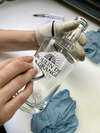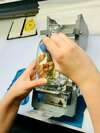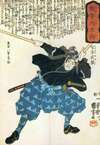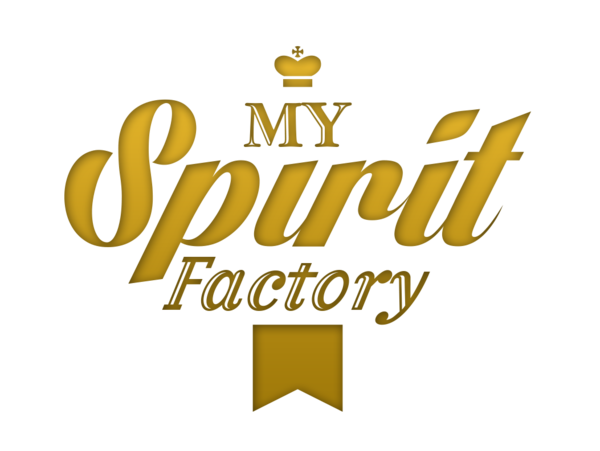Bernadet special report: social innovation and resilience as values.
A specialist in glass decoration, Maison Bernadet is at the heart of the supply tensions facing the packaging industry in 2021. Uncertainties over bottle and decanter deliveries mean that business is conducted in a permanent fog. But some companies are better equipped than others to demonstrate resilience, thanks in particular to the mindset of their managers and employees. Such is the case of Bernadet, whose business is strategic for Spirits Valley.
Hence the interest in meeting Jean-Pierre Bernadet, who has patiently established a virtuous philosophy based on the meaning given to actions, the responsibility of each individual and innovation. The leadership interview that caps the report also gives us the keys to the origin of this vision, which runs counter to the principles usually implemented in French industry.
But after all, couldn't this philosophy benefit Atlanpack, the association of which he has been president since 2018?
I) Bernadet, a company at the heart of the Spirits Valley (1951-2009)
"You should not believe that your dreams can only be realised in some distant place. If you believe this, you will neglect the possibilities of your immediate environment.
Eiji Yoshikawa
The stone and the sword.
Founded by Claude Bernadet in 1951, the eponymous company first specialised in the application of varnish and lacquer on wood and then on glass. The workshop is based on the outskirts of Cognac in Chateaubernard, behind the railway station where many agricultural plots are still cultivated. During this first period of development, Claude Bernadet perfected two inventions that revolutionised the decoration of spirits bottles: the internal varnishing process to create dummy bottles in 1951 and satin finishing by chemical treatment in 1968.
In the meantime, the imposing Saint Gobain site with its 3 ovens was built in the surrounding area in 1963 (originally 6 ovens were planned), right next to the workshop and marked the emergence of an industrial centre dedicated to packaging which gradually surrounded the company. The Bernadet company is therefore historically located in the heart of the Spirits Valley and saw the emergence of the packaging sector as we know it today.


But the crisis that the cognac industry went through in the 1990s had an impact on the company's activity. At that time, Jean-Pierre Bernadet studied business in Paris and then worked in communication and advertising. In 1997, he returned to his roots and joined the family business, occupying all the positions: from forklift driver to delivery driver, to the management of the satin-finishing workshop.
This Japanese-style background and general Japanese culture will strongly influence Jean-Pierre Bernadet in the transformation of the company when he takes over the general management in 2008. The company was then in a delicate situation...

II) Making sense: implementing a global performance strategy (2009-2018)
"The whole world has gone mad...Man looks like a dead leaf, tossed by the autumn breeze"
Eiji Yoshikawa
The stone and the sword.
Faced with the difficulties encountered by the company, Jean-pierre Bernadet chooses the path of global performance, i.e. performance in all the 'regal' areas of the company. His observation is that the loss of meaning is the main cause of the degeneration of cohesion around projects and employee motivation. Based on this premise, he relies on social innovation, meaning that employees are placed at the heart of the production, creation and innovation process, on the same level as decision-makers or shareholders.
And this philosophy is going to be relayed in the media thanks to shocking formulas of which he has the secret:
"Today, we have lost the meaning: to produce for the sake of producing, to earn money for the sake of earning money, society doesn't even know where it is going anymore" (Charente Libre, October 2018)
The challenge is therefore to give meaning back, to know where we are going, why we are going and how (a recurring theme for Jean-Pierre Bernadet, strongly influenced by his reading of "The Ballad of Narayama" by Shichirō Fukazawa).
This way, employees are involved when making strategic choices. In 2012 Bernadet decided to stop the satin finishing line and replaced it with two new workshops in 2014: glass quality control and hand decoration of precious materials.



This choice to stop the satin finishing activity is a bold one for the company that developed it. But it is part of a coherent approach for Jean-Pierre Bernadet, who wishes to move from the status of a small craft business to that of a structured, industrial company. Because if the company is successful in one area and not in another, its action cannot be sustainable.
Faced with the poor ecological performance of the satin finishing activity, it was decided to adopt an environmental approach that went hand in hand with social responsibility. This resulted in energy savings and the award of the Lucie label in 2016. This label is based on the ISO 26000 standard of social and environmental responsibility and assesses the performance of the company as a whole: shareholders, employees, customers, and environmental and social action are all considered equally.
Thus the stakes are both environmental and financial: "Anyone who is not responsible is condemning his company in the medium term" (Grand Cognac, Oct 2018)

In concrete terms, the transformation is taking place in depth for Bernadet, which has seen its staff increase from 50 people in 2009 to 90 people in 2016 (120 in peak periods) despite the closure of the satin line. Similarly, the blue ocean strategy was adopted: offering new products rather than trying to take the customers of others.
Bernadet is therefore focusing on small series, where others do not want to go. This is reflected in the arrival of new customers and the share of cognac has fallen from 98% of the business in 2009 to 55% in 2016: "We never say 'no' to a customer, we study each request... we propose solutions. If we don't, the product doesn't exist.
From an organisational point of view, work has been profoundly transformed with the end of a "hierarchical and archaic system". Everyone becomes a source of proposals: "I have put the employee back at the heart of the decision by giving him or her more autonomy. Gone is the concept of the boss, here everyone participates in identifying their needs and improving their working conditions.
Where the structure is very vertical, the focus is on making it horizontal. So there is no longer a leader whose role is to tell people what to do, but coordinators whose mission is to give others the means to do the job properly.

It is in the organisation of work that innovation takes place, in order to gain in competitiveness. By putting the staff back at the heart of the company, we find the resources and flexibility to position ourselves on new markets. To achieve this, the 5S method is also applied: tidy up, clean up, respect and clear the work areas in order to optimise space and improve the quality of life.
The result: €5 million in turnover and 25% growth in 2018. This is despite the loss of the biggest market to date, Martell VSOP bottles...
III) An event-driven philosophy (2018-2021)
"In life we must have flexibility. Our mind must be able to move freely. To be too rigid is to be brittle and lack the ability to react.
Eiji Yoshikawa
The stone and the sword.
Jean-Pierre Bernadet is an actor in the emergence of the Charente packaging sector as we know it today and knows its problems perfectly. It is therefore logical that he became president of the Atlanpack association in June 2018, which brings together 400 companies and 25,000 jobs for a turnover of 4 billion euros. Its mission: to help diversify the outlets of packaging players affected by the cognac crisis in the 1990s. Moreover, all these pooled skills contribute to the coherence of the territory.
With this strategic position within the graphic & packaging cluster, he is establishing a policy geared towards establishing contacts and exchanges between partners. But Jean-Pierre Bernadet is also taking advantage of the opportunity to raise awareness among packaging industry players of the concepts of social innovation and global performance. With shocking formulas that stand out from the corporate communication that prevails in the French industry:
"The industry is very conformist and it is difficult to think outside the box" (September 2019)
"That it is considered innovative drives me crazy because it seems natural" (Le Petit Economiste, January 2020)
"Employees have changed, bosses must adapt" (Charente Libre, January 2020)
"We have to reinvent our business (Sud Ouest, August 2020)

By the time the Covid 19 health and political episode began, Bernadet had already made innovation systemic at the employee level. 3D printers enable the direct manufacture of tools to meet technical challenges at a lower cost and with a gain in time. It also recruits an R&D manager who comes to organise projects. Many ideas need to be structured so that innovations can be managed and implemented.
Thus, employees who see their ideas effectively deployed in the field are not only loyal and motivated, they also pass on their expertise to newcomers.

The company is making headlines with a job dating event in April 2019, during which 50 fixed-term and permanent positions are to be filled. On this occasion, the values that drive the operation and the candidates are highlighted: the desire to learn, to progress, autonomy and sociability.
On this subject, Jean-Pierre Bernadet specifies that he prefers to give a chance to atypical profiles and to favour cross-disciplinary jobs : "I am looking for people who have no blinkers and an original vision of the world. The past of a person does not define his or her future, I focus above all on the human aspect and the richness of his or her life's journey. So the CV is a tool but it is not the determining factor.
Everything is done to promote belonging to an identity, to a know-how. In short, that which gives meaning to our actions. Similarly, tasks are alternated to avoid routine. All these measures nourish the resilience of a company when it faces events that can alter the quality of life at work and cause stress, such as confinements, supply tensions during the recovery or government policy.
Jean-Pierre Bernadet even plans to develop a training programme with the setting up of an internal academy (via formalised training, teaching sheets and controls). In his opinion, the wealth is in the experience and know-how. Hence the interest in focusing on qualifying technical training and the development of skills.


Today Bernadet finds itself in the midst of raw material supply tensions, in addition to the delicate social and political situation in France. In 2020, the company already saw a 27% drop in turnover, particularly following the collapse of the Asian market. Similarly, it has just lost the glass sorting market with Verallia, which supported an entire workshop.
But with the organisational and innovation tools it has integrated with its teams, it seems well equipped to face the situation. Other challenges concern the hiring of specific positions such as forklift truck operators, as well as the integration of employees from the new generation whose codes and aspirations are very different from their predecessors.
All these difficulties are perhaps an opportunity to test the path chosen by Jean-Pierre Bernadet for nearly 10 years and to learn from it.
IV) Leadership interview with Jean-Pierre Bernadet
1- What is your favourite personal or professional activity?
I'm a rebel dreamer who assumes that I am. I don't know how to accept what I'm told without understanding why and why not, I'm bound to spend time afterwards imagining how to improve and find alternatives. I have become a learning bulimic and an obsessive experimenter. A day without learning and experimenting is relaxing for some, but it depresses me.
2- Which book influenced you the most?
I discovered Japanese literature during my studies. Eiji Yoshikawa's The Stone and the Sword influenced and even built my value system. But Shichirō Fukazawa's The Ballad of Narayama is for me a unique masterpiece. His vision of social relations and our place in the world offers relevant readings regardless of culture or time. I haven't reread it in 30 years but I still think about it often.


3- Which mission has impressed you the most?
Taking over the management of the family business in the middle of the 2008 crisis, with no support, no means, no teams, just my convictions and my optimism. I didn't know it was impossible, so I did it.
4- Do you have a method to facilitate decision making?
When the stakes are high, I withdraw from the world so that I can gain perspective on events and take a systemic view. A bench in a public garden or a walk on the beach in winter with a cigar often does the trick. For other decisions, I prefer to listen to my teams or, better still, let them take the lead.
5- What is your most formative failure (your "best failure")?
I love Nelson Mandela's phrase "I never lose, either I win or I learn". Like the great virtuosos I was lucky enough to start (learning) very early. My first company depended on a very big client who was also a very good friend. He left the country by planting all his suppliers overnight and I filed for bankruptcy. I was 27 years old. I wore the suit of the one who had failed for more than 10 years in the eyes of others. I learned a lot about prejudice and resilience. It was a chance to start like that and find out that I could rise above it. It's certainly a lot harder to live with when you're older. It gave me the ability to stand back
6- Can you share a secret about your discipline as a business manager?
Think global, act local. I always think in terms of the "law of large numbers": set up three projects and accept that two will stagnate in order to make one succeed. The bad manager focuses on those that don't work, the entrepreneurial leader devotes himself to the one that does work... and re-launches three projects!

7- How much of your time do you spend on business intelligence?
The sheepdog is not at the heart of the herd but runs around to get a feel for the environment. My place is outside and on constant alert. It took me a few years to learn to spend more time on the alert than on the operational side. Ideally it's 50% of my time. In turbulent times like these, contrary to popular belief, it's even more. In difficult times, too many managers keep their heads in the sand and don't see that when the lines move, opportunities are born.
8- What is Bernadet's vision and what are its medium and long term challenges?
The company is built on Global Performance. I am constantly seeking a balance between economic, social, environmental and societal performance. To forget one of the pillars is to jeopardise the sustainability of the company. I like to repeat that our vision is to "make the grass greener here", otherwise I will go elsewhere (like the customers, the employees, etc.).
Our medium and long term challenge is to bring the CALT model to life in the company (Trust, Autonomy, Lean, Technology)
9- What advice would you give to a young entrepreneur starting a new business in 2021?
That he cultivates a realistic optimism, i.e. "it will be difficult, I know I'll have a hard time of it, but I know I'll get there" (I highly recommend Philippe Gabillet's videos and conferences on the subject)
That he regularly asks himself the following question: Why and for what do I undertake? When they have collaborators, they should share the answers to this question.
Surround yourself with your peers by getting in touch with entrepreneurial networks. We all have the same problems, and each other's experiences can be inspiring. These networks help to break the feeling of solitude that we all have at times.
JEROME SAVOYE
- Contact us for any spirits development, packaging and tailor-made services for your company (support in the organization, pack development, quality control, writing of product sheets, creation of articles, contents and biographies...)
- Download the free spirits development mind map (PDF) from our homepage here to see all the production stages at a glance:
https://www.myspiritfactory.com/
New: wellness and quality of life coaching in companies with professional speakers: sports coach / mental trainer & professional coach / hypnotherapist (off days, specific themes: stress management, communication, etc.).


